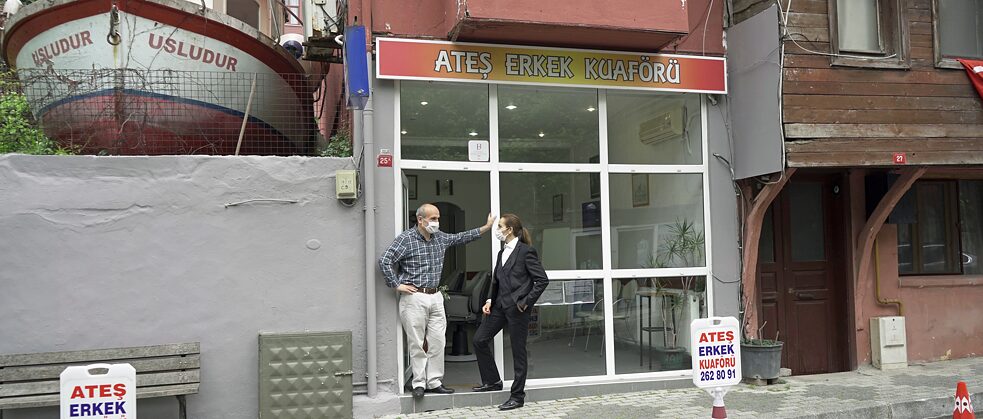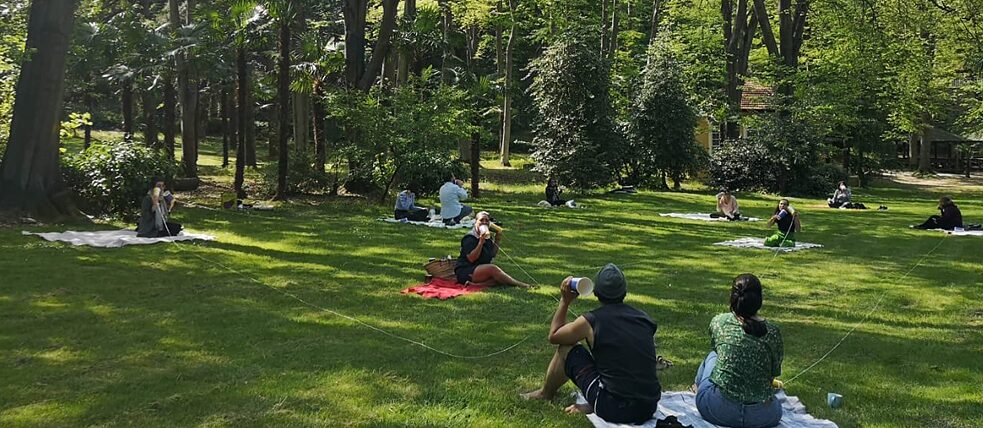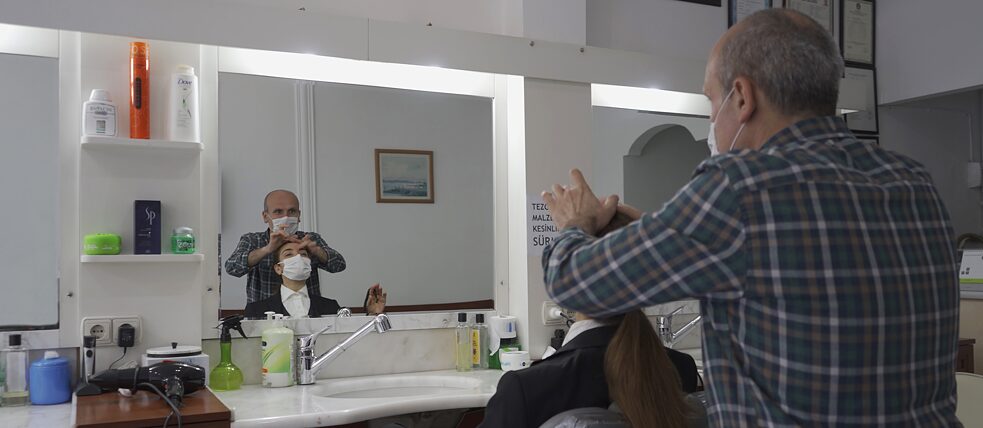Mehtap Baydu at the Kulturakademie Tarabya
“A grotesque mirror-image of digital communication”

The performance artist Mehtap Baydu from Bingöl is currently a resident at the Kulturakademie Tarabya in Istanbul. In an interview with “The Latest” at Goethe, she tells us how the coronavirus pandemic impacts her residency, how she imitates the chaos of social media platforms with a string phone, and how her fictional character “Osman” is experiencing the coronavirus crisis.
By Pia Entenmann
You began your residency at the Kulturakademie Tarabya in February then the coronavirus pandemic broke out in mid-March. Why did you stay in Istanbul and what is your everyday life like?
Although Tarabya is part of Istanbul, the largest city in Europe, it feels a little like being in a holiday resort. It’s certainly more convenient to social distance in Tarabya than in the city centre. The residency, as well as the location and nature of the accommodation make it possible for me to not be bound to artistic activities in the city and their complex, inherently hotchpotch structures. Instead, they transform all of this into a space that can be explored voluntarily.
The extensive grounds, indoor spaces, and gardens of Kulturakademie Tarabya offer a quiet working atmosphere in which we can develop neighbourly relationships with artists from various disciplines. It is also a completely new Istanbul experience for me, in a city where I wanted to realise my art projects on the streets, in cafés, and in hair salons. Instead, I’m suddenly taking part in this network from a beautiful corner of the city in a time when most social contacts are digital.
You recently initiated a “string phone performance” in Tarabya to reflect the options offered by analog communication in the digital-dominated coronavirus era. What was your idea behind it – and how did it work out?
Digitised communication media and social media platforms are playing an ever more dominant role in simplifying communication, disseminating knowledge, and sharing opinions. They provide support for professional and social interactions. However, the online world is full of diverse, contradictory, and often unsubstantiated information that ensures that these platforms can contribute to the public good as well as to chaos and uncertainty. The fact that medical professionals and governments regularly use social media to spread important information about the virus has made these opportunities even clearer in the course of the Covid-19 pandemic.
 An analog communication network in the garden of the Kulturakademie Tarabya | Photo (detail): Ünsal İçöz
An analog communication network in the garden of the Kulturakademie Tarabya | Photo (detail): Ünsal İçöz
“Paper Cup Telephone Network/Karton Bardak Telefon Ağı” is a performance that we implemented in Tarabya and that simplifies the digital communication network and converts it into an analog form. In the course of this simplification, the unclear sound transmission of the string telephone network acts as a catalyst that accelerates disinformation. Even short sentences changed after a few transmissions, sometimes involuntarily, but sometimes the opposite, through the deliberate use of inaccuracy. The performance began as a playful fiction and developed into a grotesque mirror image of modern-day digital communication.
For your residency period, you had actually planned to bring your performance character “Osman” to Turkey for the first time. Who is Osman – and how is he experiencing the coronavirus crisis?
The performance character that I call Osman represents the first generation of those known as guest workers who came to Central Europe in the 1960s. Osman is a fictional character that I came up with from black and white images that reflect his close social environment; an environment of men, confined between the workplace and the workers’ dormitory.
If Osman hadn’t been able to go to Germany to work, he would probably have ended up coming to Istanbul, the city with the highest immigration rate in Turkey. Here in Istanbul, too, he would initially have been a migrant worker who would not have been able to let his family follow him.
Years later, Osman has now returned and is trying to build a new life in Istanbul. Of course, the bureaucracy is just as difficult as it is for real people and he needs new papers.
 “Osman” at the barbershop – now possible again with face coverings. | Photo (detail): Ünsal İçöz
“Osman” at the barbershop – now possible again with face coverings. | Photo (detail): Ünsal İçöz
Osman, like everyone else, would like to sit in the coffee house and play backgammon, drink tea and discuss the situation in the country; he would like to go to the mosque on Friday, register his residence with the local administrator, look for a job at the employment office and, above all, try to understand the situation that the country is in.
With the onset of the pandemic, however, Osman went into quarantine. He, too, must adhere to the contact restriction rules. Although Osman is an art project, he is affected by the pandemic just as much as any real person.